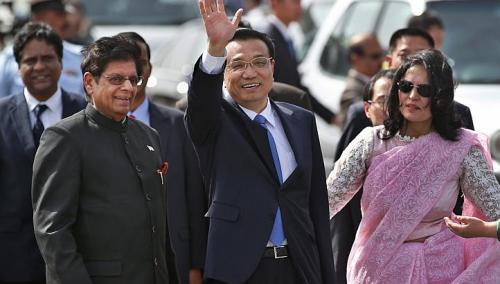
New Delhi, May 20: Prime Minister Manmohan Singh told visiting Chinese President Li Keqiang on Sunday a recent military standoff in the Himalayas could affect relations between the two countries as they looked to boost bilateral trade.
At a meeting shortly after Li arrived in India on his first foreign trip, Singh said relations were affected when "peace and tranquillity" on the border was impacted, a senior government official with knowledge of the discussions told Reuters.
The official said Singh was referring to a three-week standoff over disputed territory in the western Himalayas, which was only resolved on May 3 after a public outcry in India.
The world's two most populous nations disagree about large areas on their ill-defined border and fought a brief but bloody war across it 50 years ago. Although there have been no shooting incidents for decades, both sides maintain a large military presence and often patrol inside disputed areas.
The latest incident distracted diplomats' attention from negotiations on investment and trade ahead of Li's trip and soured Indian public opinion toward China.
TRADE
Bilateral trade between the two countries touched $73 billion in 2011, making China India's largest trade partner, but slipped to $66 billion last year.
Singh also said it was important to find a way to balance out India's $29 billion trade deficit with China as the two countries aim for $100 billion in bilateral trade by 2015.
"While we are committed to the $100 billion by 2015 we will have to have a more balanced rate," said the official, who was briefed about the restricted meeting.
The official described the conversations as constructive and cordial but said he did not know Li's response to Singh's comments.
"I am looking forward to exchanging views with Indian leaders on bilateral ties and regional and global issues of common concern," Li said in a statement issued after his arrival in India and reported by China's state news agency Xinhua.
Up from next to nothing in the 1990s, trade has been heavily skewed in favour of China. It exports power and telecoms equipment to its neighbour, which as one of the world's fastest growing major economies could offer brighter opportunities for business than the stagnant West.
The growing deficit is a bone of contention though, and India is pressing for greater access for its pharmaceuticals and IT services.
China has never sought a trade surplus or blocked imports, its deputy trade minister Jiang Yaoping said on Thursday, blaming the imbalance on "differences in the two countries' economic structures".
Prior to the visit, Li said he chose his first destination on the four nation tour to show how important India is for China and also because he had fond memories of visiting as a Communist youth leader 27 years ago.
The two countries are expected to sign agreements on trade, agriculture, the environment and culture, Xinhua said after Li arrived on Sunday. Li is due to leave India on Wednesday to travel to Pakistan, then Switzerland and Germany.





Comments
Add new comment